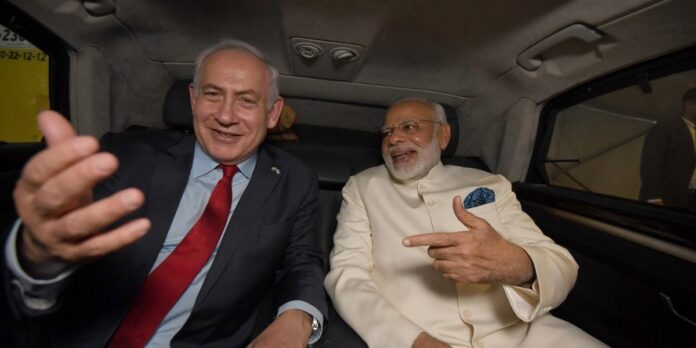By Arshad Shaikh
NEW DELHI: An important tool to punish rogue nations apart from military action is the imposition of economic sanctions. Sanctions can act as a form of diplomatic pressure, compelling the aggressor to reconsider its actions. There are instances where sanctions have successfully contributed to ending conflicts or altering aggressive behaviour. For example, sanctions played a vital role in the international response to the apartheid regime in South Africa, which ultimately helped in bringing about its downfall.
America’s military support to Israel in the form of significant financial aid ($3.3 billion annually), advanced weaponry, and joint military exercises, reflects a long-standing strategic alliance. Despite the genocidal war on Gaza by Israel, the American military support to Israel continues unabated. Many say, the United States is the enabler-in-chief of the genocide of Palestinians.
India has also been actively exporting military equipment to Israel. Recent reports indicate that India has exported approximately $2.9 billion worth of military equipment to Israel over the past decade, which includes items such as combat drones, missiles, and surveillance systems. Despite the escalation of conflict in Gaza, India’s defence exports to Israel have reportedly remained unaffected. This shows the robust defence collaboration between the two nations. For example, the two countries have agreements like the Bilateral Innovation Agreement signed in November 2021, which emphasizes cooperation in defence research and development. Deeply troubled by such open support to Israel, a group of concerned citizens wrote to Defence Minister Rajnath Singh, saying, “We are writing to you as concerned citizens, alarmed at the continued grant of export licenses and permissions to various Indian companies, for the supply of military arms and munitions to Israel, since the war on Gaza began. The International Court of Justice (ICJ) has clearly ruled that Israel is in violation of obligations under the Genocide Convention and further that Israel is in illegal occupation of the occupied Palestinian territory.” The same group then filed a petition in the apex court after receiving a lukewarm response from the government.
Senior Supreme Court advocates Prashant Bhushan and Cheryl D’Souza represented the petitioners as their legal counsel. The petition argued that these exports from India to Israel violate international humanitarian law.
The petition was filed under Article 32 of the Constitution (violation of fundamental rights) and as also violations of Articles 14, 21, and 51(c) of the Constitution (equality before the law, protection of life and personal liberty, and respect for international law and treaty obligations).
However, the apex court avoided making any direct judgment on the issue. The judgment is disappointing as there were great expectations from the highest palladium of justice in the country to take a strong stand on serious human rights concerns even if the perpetrators are backed by the rich and the powerful. Actually, in this case, Israel has massacred thousands of Palestinians violating every international statute and so the case against it is without any ambiguity.
Unfortunately, the line adopted by the Supreme Court can be termed as a “hands-off” approach. The SC dismissed the petition citing several key reasons. It explained that the Union Government has the authority over foreign affairs, as stated in Article 73 of the Constitution. Since Israel is a sovereign nation, the court said that Israel cannot be brought under the court’s jurisdiction because of the principle of sovereign immunity. The SC also pointed out that cancelling export licences could lead to breaches of international contracts, which might hurt the financial interests of Indian companies. It pointed out that the Union Government has enough legal power under existing laws to take action if necessary against those companies who were exporting defence equipment to Israel.
The SC stressed its own limitation in interfering with foreign policy matters, respecting the separation of powers between the judiciary and the executive. Although international law is generally considered part of national law unless specifically excluded, the court clarified that its statements do not express any opinion on how the Indian government or other sovereign nations conduct foreign policy. The apex court further stated that the use of Article 32 was not appropriate for the kind of reliefs the petitioners were seeking. It cautioned against the risks of issuing orders to stop actions without fully considering the possible consequences. Finally, the SC recognized that the government has the authority under the Foreign Trade (Regulation and Development Act) and the Customs Act, 1962 to impose restrictions if necessary.
The petitioners, however, argued that the focus should be on India’s own actions. Allowing arms exports that could contribute to the genocide in Gaza would be clearly violative of Articles 14, 21, and 51(c) of the Constitution. The petitioners argued that previous rulings by both Indian and international courts have emphasized that countries must uphold global human rights standards, regardless of the situation. In fact, other countries have already done so. For example, the UK has suspended around 30 arms export licences to Israel, citing a clear risk that these arms could be used to commit serious violations of international humanitarian law.
Germany has also halted some military shipments, and so have many other European nations. The court’s argument that cancelling these deals could harm the financial interests of companies is extremely flawed as it would be equivalent to giving an open licence to anybody to commit acts of terror and violence, as long as they involved commercial interests. Given India’s international commitments, and track record in supporting causes like the protection of human rights, and bringing about peace in international conflicts, the petitioners believe the court should have stepped in to ensure the government acts in accordance with international law. However, it was not to be and the Supreme Court turned the other way when asked to stop India’s defence exports to Israel.





